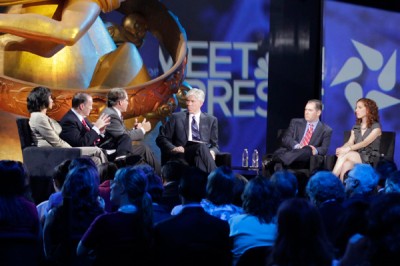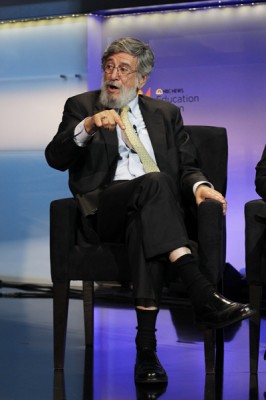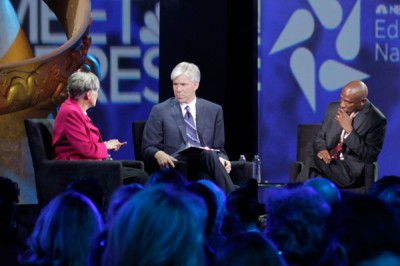The third day of Education Nation kicked off with a lively debate between charter school manager and educator Geoffrey Canada and education historian Diane Ravitch. Canada applauded the success of the charter schools in Harlem and elsewhere, with Ravitch countering that his schools and other charters had far more resources at their disposal than the average public school. Talk then branched into many of the public-private partnerships that some charters use. Canada, in his usual animated fashion, said he didn’t mind the private funding. He argued that private companies provide funds for new and potentially transformative ideas. “Education has no pressure to innovate whatsoever,” said Canada. Ravitch answered with a rejoinder that one in three charter schools, which have been given more freedom to experiment with curriculum and governance structure, perform worse than the local public school, and that most “have to clean up their act.”
In a later panel, Andrew Rotherham, a columnist at Time.com who also writes the widely read Eduwonk blog, referenced the part of the talk between Ravitch and Canada relating to private funding in charters. Only 12-13 percent of charters are privately managed, he said, calling that debate “silly.”
Elizabeth Green of GothamSchools, a website devoted to covering New York City public schools, said that all charters have the option to do things differently, defining them “as a system of schools, not a school system.”

Panel with, from left, Rehema Davis, Steven Brill, Nicholas Lemann, Andrew Rotherham and Elizabeth Green (photo by Nick Pandolfo)
A running theme through Education Nation’s panels has been a debunking of the argument that America’s education problems are financial. Many panelists said that the $650 billion education budget is one of the greatest in the world. “It’s outrageous that we can’t give our children a good education,” said Steven Brill, author of the new book Class Warfare. “And it’s not about money.”
Another popular talking point in multiple panels has been the lack of creativity in American schools as the focus on math, reading, and tests has increased. Harvard University president Drew Faust shared stories about a recent trip to China, when educators asked repeatedly about the humanities and liberal arts — something they see as missing in their institutions.
Teacher quality and assessment were again big focuses today. Here are some quotes from the day around this topic:
Diane Ravitch:
Comparing the American system to Finland, where she said education schools are highly competitive, she said of America: “People can get a teaching degree without ever seeing a student.”

Marc Tucker, president and CEO of The National Center on Education and the Economy (photo by Nick Pandolfo)
“You don’t assess [teachers] with tests … You have excellent principals and peer reviewers look at their work.”
“We have a teaching profession that’s not really even a profession.”
Geoffrey Canada:
“If there are lousy teachers, it’s because some lousy administrator hired them.”
“Some people cannot teach.”
Steven Brill:
“The one workplace in America where performance has never mattered is K-12 education.”
Marc Tucker, CEO and President of the National Center on Education and the Economy:
“Our teachers are treated like interchangeable parts.”
“We don’t expect them to bring high skills to the job.”
Other countries “would laugh at the idea that you can teach a teacher to teach in six weeks.”




